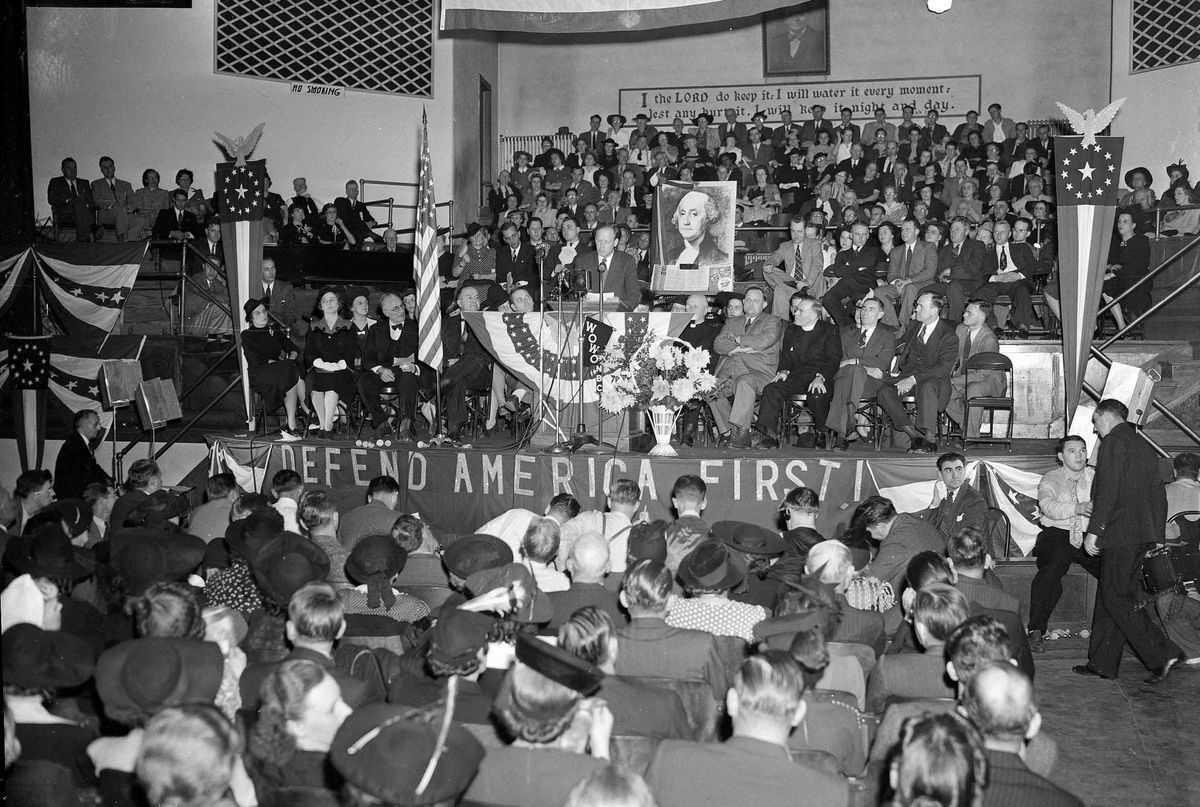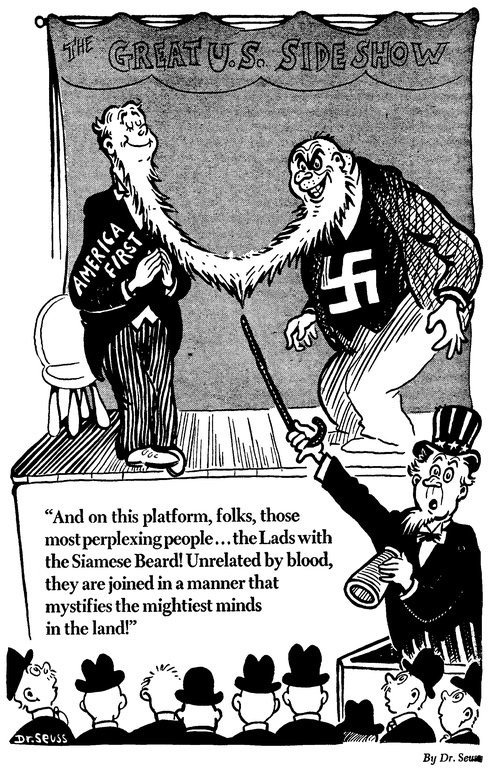The Republican Party has fully embraced “America First.” What are the origins of this phrase?

A few minutes every morning is all you need.
Stay up to date on the world's Headlines and Human Stories. It's fun, it's factual, it's fluff-free.
During President Donald Trump’s 2016 campaign in the United States, the real estate mogul revived the “America First” slogan that first gained prominence – and infamy – in the 20th century. While the phrase has been unfurled throughout the decades to advocate for isolationism and American exceptionalism, historically those political views have also provided cover for Nazism, the Ku Klux Klan and white supremacy.
Instead of shying away from the stigma of the phrase, though, Trump and the Republican Party have fully embraced it as a guiding principle. The phrase was deployed multiple times at the party’s recent convention, with Secretary of State Mike Pompeo breaking precedent by appearing at the convention to promote Trump’s “America First vision.”
America First at the Republican National Convention
In his speech on the last night of this year’s Republican National Convention, Trump only used the phrase once. “Together we have ended the rule of the failed political class, and they are desperate to get their power back by any means necessary. You have seen that. They are angry at me because instead of putting them first, I very simply said, ‘America first.’”
Even with Trump’s restraint, the phrase was heard throughout the convention. Vice President Mike Pence said it in his Wednesday night speech that also assured the Trump administration would “make America great again, again.” Then there was Pompeo’s use of the phrase as he spoke from Jerusalem on the second night of the convention.
Former US Ambassador to the United Nations Nikki Haley used her opening night speech for a little bit of wordplay around the phrase.
“Joe Biden and the Democrats are still blaming America first. Donald Trump has always put America first. He has earned four more years as president.”
Back in 2016, Trump’s closing RNC speech used the phrase twice.
“The most important difference between our plan and that of our opponents, is that our plan will put America first. Americanism, not globalism, will be our credo. As long as we are led by politicians who will not put America First, then we can be assured that other nations will not treat America with respect. This will all change in 2017.”
The 2016 convention even featured “Make America First Again” as its theme on the night, playing on Trump’s “Make America Great Again” campaign slogan.
The America First Committee
By all appearances, “America First” has become one of the guiding concepts of the modern American, pro-Trump conservative movement. The phrase is featured in the names of groups that support Trump’s policies and presidency, including the America First Policies nonprofit organization and its related America First Action Super PAC.
Students of history know, of course, that one of the most famous uses of America First was the America First Committee (AFC). Founded in 1940, the organization was an isolationist group that opposed the US entering World War II. Those in the isolationist movement spanned the political divide from Nazi sympathizers to socialists.
Yet, the AFC is now most famously known as being home to avowed anti-Semites, including automobile tycoon Henry Ford (whose writings inspired Hitler to a certain degree) and aviator Charles Lindbergh, who openly praised Hitler.
Though the AFC maintained that its intention was purely keeping America out of the war, not supporting Germany, many saw the group’s motives as inherently linked to Nazism. Famously, Theodor Seuss Geisel, the author and illustrator known as Dr. Seuss, criticized the “America First” ethos in political cartoons that ran in the 1940s.

Perhaps the most well-known cartoon features the title, “The Great U.S. Side Show.” In it, two men, one labeled “America First” and the other sporting the Nazi swastika, are connected by a beard. The text of the cartoon reads:
“And on this platform, folks, those most perplexing people… the Lads with the Siamese Beard! Unrelated by blood, they are joined in a manner that mystifies the mightiest minds in the land!”
Lindberg’s infamous speech
A speech Lindbergh gave in Iowa on September 11, 1941, is credited with undermining the AFC’s efforts to downplay anti-Semitism in its ranks. While Lindbergh acknowledges “the persecution of the Jewish race in Germany,” he still faults them as a group for pushing America toward entering the war.
“I am saying that the leaders of both the British and the Jewish races, for reasons which are as understandable from their viewpoint as they are inadvisable from ours, for reasons which are not American, wish to involve us in the war.”
Lindbergh also trotted out the persistent anti-Semitic trope that Jews control the media.
“Their greatest danger to this country lies in their large ownership and influence in our motion pictures, our press, our radio and our government.” (Trump has frequently been accused of using similar anti-Semitic tropes.)
Three months after Lindbergh’s speech, Japan bombed the US naval base at Pearl Harbor, drawing the US into the war and – for a time – ending the “America First” movement.
The origins of “America First”
Sarah Churchwell, a professor of American Literature at the University of London, published “Behold, America,” a history of the “America First” phrase, in 2018. In her book, Churchwell notes that many people erroneously cite the 1930s anti-war movement and subsequent America First Committee as the origin of “America First.”
During the 2016 campaign, The Washington Post published an article entitled, “Donald Trump’s new favorite slogan was invented for Nazi sympathizers.” The author, Eric Rauchway, professor of history at the University of California, Davis, states in the 1930s, “the U.S. media baron William Randolph Hearst began touting the slogan ‘America First’ against President Franklin Roosevelt.”
In fact, Churchwell writes, President Woodrow Wilson launched the phrase into the popular consciousness in a 1915 speech in which he said, “Our whole duty for the present, at any rate, is summed up in the motto: America First.”
Wilson’s successor, Warren G. Harding, would go on to use the phrase in his ultimately successful 1920 presidential campaign. Even Franklin D. Roosevelt unleashed the phrase in his 1932 campaign.
The phrase was also used by the Ku Klux Klan in the 1920s, a full decade before it became associated with the isolationist movement.
“By 1940 ‘America first’ had been entangled in America’s political narrative for decades,” Churchwell writes. “Charles Lindbergh and the America First Committee of 1940 were not the beginning of the story of ‘America first.’ They were the end – until Donald Trump resuscitated the term.”
Have a tip or story? Get in touch with our reporters at tips@themilsource.com




Comments ()